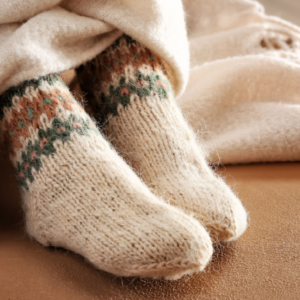Winter Preparedness and Tips for Safety
by Robin Bush ISR Communications
Leaves are turning, so it is time to turn our attention to being prepared for winter. Emergency preparedness is always essential, but winter preparedness has unique considerations when we can expect cold, snow, power outages, and hazardous driving conditions. The key to being safe this winter lies in planning ahead.
Consider what is essential for your daily living. What would you need to be safe, fed, and warm if no one could reach you during a winter storm? Consider arranging for plowing your driveway and someone to shovel a walkway to your door. Do you have sand to spread on icy areas to lessen the chance of falling if you do go outside? Do you have a backup plan for life-sustaining medical devices if there are interruptions in power? Do you have medications and medical supplies you might need for as long as two weeks? Who can you call for assistance (friends, neighbors, relatives), and could they reach you? How will you keep your phone charged? If you are caring for someone with special needs, you need to plan their care. Consider going to stay with someone, so you are not alone and plan how you will get there.
Aside from being prepared, you need to be able to reach out for help. Be sure to:
- List emergency contact numbers and keep them by your phone. (family, friends, neighbors, your doctors, veterinarian)
- Get a Vial of LIFE at Island Senior Resources Bayview or Island Senior Resources Oak Harbor, complete the forms inside, and follow instructions on where to place it in your refrigerator and where to put signs to notify emergency personnel of your medical conditions.
- Keep Island Senior Resources’ phone number handy for requesting assistance:(360) 321-1600 or (360) 678-3373.
Keep these supplies on hand (if it’s too much to gather or purchase these all at once, then get a few each month until you have them all):
- First aid kit
- Flashlight and extra batteries
- Battery-operated radio with extra batteries
- cell phone with charger and a fully charged backup battery supply
- Backup power supply for any device that would create a life-threatening situation if you should lose power
- Prescription medication for at least seven days
- Personal hygiene supplies
- Back up medical supplies like hearing aid batteries or a manual wheelchair
- Non-perishable food supply for at least five days (for pets too)
- Canned or dried foods (freeze-dried prepared meals can be purchased)
- One gallon of water per person per day for at least five days
- Manual can opener
- Extra blankets and warm clothing
- shovel
- toilet paper
Tips for Winter Weather Safety:
- Watch for slippery pavement. Be sure walkways and stairs are clear of ice and snow
- Wear boots with non-skid soles, and allow extra time to cross streets
- Wear light or fluorescent-colored clothing at night and carry a flashlight
- Keep your radio tuned in when extreme weather is predicted
- Dress warmly with a hat, gloves, warm boots, a scarf, and warm layers
- Eat enough food, drink water, and stay as active as possible
- Check on neighbors and have them check in on you
- Don’t shovel snow if you have a heart problem or you are not in condition to do so
- Do not heat your home with a BBQ or your gas stove/oven
- Be sure to have smoke detectors and carbon monoxide detectors with fresh batteries.
- Be sure space heaters are three feet from anything that might catch fire
- Winterize your car with anti-freeze, good tires, and windshield wipers
- Bring your cell phone whenever you leave your home and let someone know where you are going
- Carry emergency gear in your car: first aid kit, blankets, warm clothing, jumper cables,
- windshield scraper, shovel, rock salt or sand, water, dried food, chains, flares,
- flashlight and batteries
Many helpful resources from the American Red Cross, CDC, AARP, and others are available on the internet. If you need help accessing these, there is a computer in the lobby of Island Senior Resources-Bayview, and our staff can assist you in its use. There are also books on emergency survival available at Sno-Isle library.

